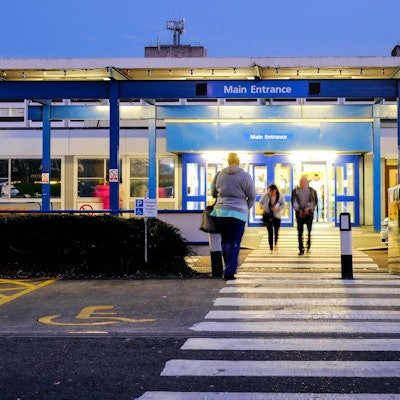
An inquest held on 16 February in Preston, U.K., heard how a 35-year-old hospital worker died after two radiologists failed to identify basilar artery thrombosis on a CT scan. A senior radiologist colleague told the tribunal that the patient's fatal clot had been "a difficult call which anyone could miss," according to a national newspaper article.
Kerry Halpin, a mother of two children, had gone to Blackpool Victoria Hospital two days before her death. She complained of headaches, nausea, neck stiffness, and sensitivity to light. An initial CT scan was wrongly judged to be normal, the Mirror reported on 17 February.
She described the pain as "one of the worst headaches of her life," and accident and emergency (A&E) doctors suspected she was suffering from either a brain hemorrhage or an infection in the brain such as meningitis or encephalitis. Halpin was immediately started on broad-spectrum antibiotics and sent for a CT scan.
 The main entrance of the Royal Preston Hospital in North West England, where Kerry Halpin died on 1 November 2019.
The main entrance of the Royal Preston Hospital in North West England, where Kerry Halpin died on 1 November 2019.Senior consultant radiologist Dr. Martina Paetzel and a colleague both deemed the scan to be normal and reported this back to staff on the hospital ward, the Mirror continued. Paetzel became head of radiology at Blackpool Victoria Teaching Hospitals in November 2020 and has worked as a consultant in the National Health Service (NHS) for over seven years, according to her LinkedIn site, accessed on 21 February 2021. Her subspecialty interests include pediatric, musculoskeletal, and chest radiology.
Second CT scan
On the following day, a second CT scan revealed that Halpin had basilar artery thrombosis. At the inquest, senior coroner Dr. James Adeley heard that the 2-3 mm clot had been visible on the first scan, but neither radiologist spotted it.
The first scan was shown on a big screen during the inquest and a small, bright white spot was pointed out near the base of the brain and was later revealed to be the blood clot, the Mirror reported. The inquest heard it is "very common" for artery calcification to show up as small areas of white on a brain CT.
The consultant who was in charge of Halpin's care on the acute medical unit, Dr. Abaid Rehman, said basilar artery thrombosis had "not been on his radar," according to the article.
"It was shocking for me when I found out later on," he said. "She was young, only 35, with no prior medical history. To be honest, it was at the very bottom of my differential diagnoses. I've worked since 2009 in many different countries and I've never seen a single basal artery thrombus."
Dr. Paul Billington, a consultant radiologist at Blackpool Fylde and Wyre Hospitals NHS Foundation Trust, carried out a review of the case after the blood clot was subsequently identified on the second scan, the Mirror continued. After a discrepancy meeting with a number of radiologists, Billington said the clot had been "a difficult call which anyone could miss."
"I thought it was a normal scan when I first saw it," he added.
The inquest heard that the first CT scan revealed no signs of parts of the brain being affected as a result of lack of blood supply, but by the following day, these changes were apparent, the Mirror reported.
"When reviewed with the subsequent scan the next day, I could see, in particular, the cerebellum changes," Billington said.
Other evidence
Dr. Siddhartha Wuppalapati, a neurosurgical consultant at the Royal Preston Hospital who is "highly specialized" in removing blood clots in the brain, told the inquest he only comes across two or three cases of basilar artery thrombosis a year across a population of 1.8 million, and in 10 years he has treated just 25 patients, the article stated. Wuppalapati said he could not understand why someone so young would have suffered from basilar artery thrombosis.
"The only possible causes would be a heart condition, blunt trauma to the neck or if they had an existing blood clotting condition," he said. "It (basilar artery thrombosis) is quite a difficult diagnosis to make as the clinical condition is not very straightforward."
Wuppalapati explained that the type of clot in Halpin's case "doesn't present like a typical stroke" and that, depending on the size of clot and a patient's condition, in his experience, roughly 50% of patients would survive if they received treatment in time.
The inquest heard that the mechanical thrombectomy service provided by Wuppalapati and his team was only operational during normal working hours, the Mirror reported.
"I am really upset and angry that we are not providing this service out-of-hours," he said.
Also, the coroner criticized the method for referring patients to the regional neurosurgical team at Preston and noted a discrepancy between the times recorded at both hospitals.
"I am unconvinced by a long chalk that this is operationally safe," the coroner said.
Dr. Nicholas Park, a consultant neurosurgeon at the Royal Preston Hospital who treated Halpin, told the inquest that by the time she was referred to his team, the morning after she attended A&E, her condition was "irretrievable." The distance between Blackpool and Preston is around 17 miles (27 km).
"When she was intubated there were signs of cardiovascular instability," he said. "She had fixed pupils, which is a sign of brain stem damage."
Concluding statements
Wrapping up, the coroner said that while "the outcome is hugely uncertain," it might have made a difference if Halpin had been transferred to Preston earlier, the Mirror stated.
"With the benefit of hindsight, the initial scan showed a basal artery thrombus measuring 3 mm in diameter and 14 mm long which caused the death of the back part of the brain," he said. "At a subsequent review meeting by the radiology team, the scan was presented to radiology consultants and registrars, but any such presentation immediately puts everyone on notice that there is a problem."
"What would have happened had the thrombus been spotted on that scan is difficult to predict. There would have been the interval of contacting neurosurgery at the Royal Preston Hospital, which we have heard from this case was far from straightforward."
"In a perfect world, we would have the mechanical thrombectomy service 24 hours a day, but it treats only two or three cases like this a year and it would have diverted resources from elsewhere," he said.
Dr. Jim Gardner, medical director at Blackpool Teaching Hospitals NHS Foundation Trust, told the inquest that a full investigation into what happened has been undertaken, and the trust will make sure that everything that can be learned from the woman's death is implemented and shared widely with staff, the Mirror concluded.



















